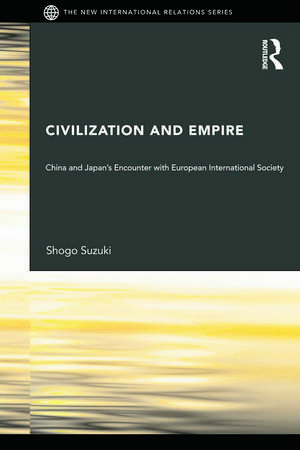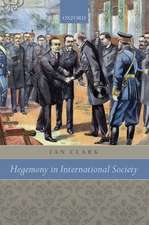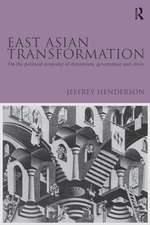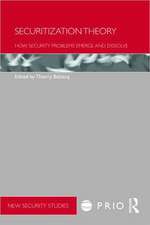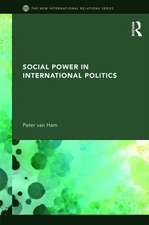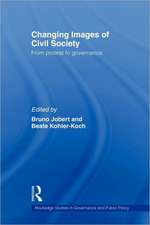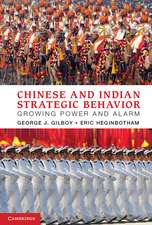Civilization and Empire: China and Japan's Encounter with European International Society: New International Relations
Autor Shogo Suzukien Limba Engleză Paperback – 30 apr 2011
Challenging existing works that have presented the expansion of (European) International Society as a progressive, linear process, this book contends that imperialism – along with an ideology premised on ‘civilising’ ‘barbarous’ peoples – played a central role in its historic development. Considering how these elements of International Society affected China and Japan’s entry into it, Shogo Suzuki contends that such states envisaged a Janus-faced International Society, which simultaneously aimed for cooperative relations among its ‘civilized’ members and for the introduction of ‘civilization’ towards non-European polities, often by coercive means. By examining the complex process by which China and Japan engaged with this dualism, this book highlights a darker side of China and Japan’s socialization into International Society which previous studies have failed to acknowledge.
Drawing on Chinese and Japanese primary sources seldom utilized in International Relations, this book makes a compelling case for revising our understandings of International Society and its expansion. This book will be of strong interest to students and researcher of international relations, international history, European studies and Asian Studies.
| Toate formatele și edițiile | Preț | Express |
|---|---|---|
| Paperback (1) | 400.60 lei 6-8 săpt. | |
| Taylor & Francis – 30 apr 2011 | 400.60 lei 6-8 săpt. | |
| Hardback (1) | 949.47 lei 6-8 săpt. | |
| Taylor & Francis – 2 feb 2009 | 949.47 lei 6-8 săpt. |
Din seria New International Relations
-
 Preț: 295.14 lei
Preț: 295.14 lei -
 Preț: 424.75 lei
Preț: 424.75 lei -
 Preț: 393.17 lei
Preț: 393.17 lei -
 Preț: 310.70 lei
Preț: 310.70 lei -
 Preț: 277.04 lei
Preț: 277.04 lei - 18%
 Preț: 949.47 lei
Preț: 949.47 lei -
 Preț: 387.16 lei
Preț: 387.16 lei - 18%
 Preț: 1055.51 lei
Preț: 1055.51 lei - 18%
 Preț: 1167.71 lei
Preț: 1167.71 lei - 18%
 Preț: 1053.95 lei
Preț: 1053.95 lei -
 Preț: 469.64 lei
Preț: 469.64 lei -
 Preț: 448.86 lei
Preț: 448.86 lei - 18%
 Preț: 1058.79 lei
Preț: 1058.79 lei - 26%
 Preț: 822.54 lei
Preț: 822.54 lei - 15%
 Preț: 434.52 lei
Preț: 434.52 lei -
 Preț: 416.22 lei
Preț: 416.22 lei - 26%
 Preț: 819.90 lei
Preț: 819.90 lei -
 Preț: 446.53 lei
Preț: 446.53 lei -
 Preț: 412.52 lei
Preț: 412.52 lei - 25%
 Preț: 853.07 lei
Preț: 853.07 lei - 18%
 Preț: 1112.34 lei
Preț: 1112.34 lei -
 Preț: 431.35 lei
Preț: 431.35 lei - 18%
 Preț: 1113.95 lei
Preț: 1113.95 lei - 28%
 Preț: 821.46 lei
Preț: 821.46 lei -
 Preț: 484.47 lei
Preț: 484.47 lei - 15%
 Preț: 485.91 lei
Preț: 485.91 lei - 18%
 Preț: 1272.54 lei
Preț: 1272.54 lei - 18%
 Preț: 1060.52 lei
Preț: 1060.52 lei - 22%
 Preț: 338.68 lei
Preț: 338.68 lei - 18%
 Preț: 1059.84 lei
Preț: 1059.84 lei -
 Preț: 410.50 lei
Preț: 410.50 lei - 18%
 Preț: 1060.52 lei
Preț: 1060.52 lei -
 Preț: 472.82 lei
Preț: 472.82 lei - 18%
 Preț: 1058.79 lei
Preț: 1058.79 lei - 28%
 Preț: 819.09 lei
Preț: 819.09 lei - 18%
 Preț: 1056.63 lei
Preț: 1056.63 lei - 18%
 Preț: 1118.46 lei
Preț: 1118.46 lei - 18%
 Preț: 1055.51 lei
Preț: 1055.51 lei - 18%
 Preț: 1052.35 lei
Preț: 1052.35 lei -
 Preț: 312.96 lei
Preț: 312.96 lei - 18%
 Preț: 1147.69 lei
Preț: 1147.69 lei
Preț: 400.60 lei
Nou
Puncte Express: 601
Preț estimativ în valută:
76.66€ • 80.24$ • 63.80£
76.66€ • 80.24$ • 63.80£
Carte tipărită la comandă
Livrare economică 31 martie-14 aprilie
Preluare comenzi: 021 569.72.76
Specificații
ISBN-13: 9780415665421
ISBN-10: 0415665426
Pagini: 274
Ilustrații: 7 b/w images, 2 tables, 4 halftones and 3 line drawings
Dimensiuni: 156 x 234 x 15 mm
Greutate: 0.39 kg
Ediția:1
Editura: Taylor & Francis
Colecția Routledge
Seria New International Relations
Locul publicării:Oxford, United Kingdom
ISBN-10: 0415665426
Pagini: 274
Ilustrații: 7 b/w images, 2 tables, 4 halftones and 3 line drawings
Dimensiuni: 156 x 234 x 15 mm
Greutate: 0.39 kg
Ediția:1
Editura: Taylor & Francis
Colecția Routledge
Seria New International Relations
Locul publicării:Oxford, United Kingdom
Public țintă
Postgraduate and UndergraduateCuprins
Introduction 1. Socialization into International Society 2. The East Asian International Society 3. Acquiring Knowledge: Chinese and Japanese Perceptions of European International Society 4. Learning the Competence and Skill to be a ‘Civilized’ State: State Reconfiguration in China 5. Learning the Competence and Skill to be a ‘Civilized’ State: State Reinvention in Japan 6. Demonstrating ‘Civilized’ Identity: Dismantling the Tribute System. Conclusion.
Recenzii
How did contemporary international society develop? Suzuki provides a compelling account of its East Asian dimension. Shifting the English-school focus from 'society' to 'socialization’, he shows how Japan absorbed lessons from its encounter with European society that were different from those learned by China, and included its imperial dimension. Rather than offer a Eurocentric narrative, Suzuki weaves together a rich indigenous tapestry. The result is a landmark study.
Ian Clark FBA, ESRC Professorial Fellow and E H Carr Professor, Department of International Politics, Aberystwyth University, UK
Suzuki succeeds magnificently at three levels with this book. It is, first, a major work of scholarship, using Japanese, Chinese and English language sources to reassess China and Japan's interaction with the West in the Nineteenth Century. Secondly, it offers the most nuanced analysis of Nineteenth Century international society to appear to date. Thirdly, it is an important development of the 'English School' argument that the international society concept provides an alternative (and more sophisticated) theoretical starting point for the study of international relations than the currently dominant Realist perspectives.
Professor David Armstrong, Department of Politics, University of Exeter, UK
"A refreshing view on the subject through its detailed analysis of elite writings in China and Japan between the 1860s and 1895. Suzuki’s account of Chinese and Japanese reactions to Western literature is very informative. Indeed, what makes Suzuki’s book stand out is that he studies international relations in East Asia through the eurocentric concept of European International Society but uses an asiacentric perspective. For this, he deserves a great deal of credit because too many publications still present China and Japan as passive powers which only reacted to the Western powers." - Ariane Knusel, Comparativ 22 (2012), Vol. 3
"How did contemporary international society develop? Suzuki provides a compelling account of its East Asian dimension. Shifting the English-school focus from 'society' to 'socialization’, he shows how Japan absorbed lessons from its encounter with European society that were different from those learned by China, and included its imperial dimension. Rather than offer a Eurocentric narrative, Suzuki weaves together a rich indigenous tapestry. The result is a landmark study." - Ian Clark FBA, ESRC Professorial Fellow and E H Carr Professor, Department of International Politics, Aberystwyth University, UK
"Suzuki succeeds magnificently at three levels with this book. It is, first, a major work of scholarship, using Japanese, Chinese and English language sources to reassess China and Japan's interaction with the West in the Nineteenth Century. Secondly, it offers the most nuanced analysis of Nineteenth Century international society to appear to date. Thirdly, it is an important development of the 'English School' argument that the international society concept provides an alternative (and more sophisticated) theoretical starting point for the study of international relations than the currently dominant Realist perspectives." - Professor David Armstrong, Department of Politics, University of Exeter, UK
"Summing Up: Recommended. Upper-division undergraduate collections." - J. M. Peek, CHOICE (February 2010)
"Unarguably, this is a brilliant volume that enables us to acquire a deeper understanding of the lineage of civilization and empire. Given the appearance of this work, I wish that IR scholars would become more sensitive to the Janus face of the International Society." - Tetsuya Sakai, The University of Tokyo, International Relations of the Asia-Pacific Volume 10 (2010) 373–379
Ian Clark FBA, ESRC Professorial Fellow and E H Carr Professor, Department of International Politics, Aberystwyth University, UK
Suzuki succeeds magnificently at three levels with this book. It is, first, a major work of scholarship, using Japanese, Chinese and English language sources to reassess China and Japan's interaction with the West in the Nineteenth Century. Secondly, it offers the most nuanced analysis of Nineteenth Century international society to appear to date. Thirdly, it is an important development of the 'English School' argument that the international society concept provides an alternative (and more sophisticated) theoretical starting point for the study of international relations than the currently dominant Realist perspectives.
Professor David Armstrong, Department of Politics, University of Exeter, UK
"A refreshing view on the subject through its detailed analysis of elite writings in China and Japan between the 1860s and 1895. Suzuki’s account of Chinese and Japanese reactions to Western literature is very informative. Indeed, what makes Suzuki’s book stand out is that he studies international relations in East Asia through the eurocentric concept of European International Society but uses an asiacentric perspective. For this, he deserves a great deal of credit because too many publications still present China and Japan as passive powers which only reacted to the Western powers." - Ariane Knusel, Comparativ 22 (2012), Vol. 3
"How did contemporary international society develop? Suzuki provides a compelling account of its East Asian dimension. Shifting the English-school focus from 'society' to 'socialization’, he shows how Japan absorbed lessons from its encounter with European society that were different from those learned by China, and included its imperial dimension. Rather than offer a Eurocentric narrative, Suzuki weaves together a rich indigenous tapestry. The result is a landmark study." - Ian Clark FBA, ESRC Professorial Fellow and E H Carr Professor, Department of International Politics, Aberystwyth University, UK
"Suzuki succeeds magnificently at three levels with this book. It is, first, a major work of scholarship, using Japanese, Chinese and English language sources to reassess China and Japan's interaction with the West in the Nineteenth Century. Secondly, it offers the most nuanced analysis of Nineteenth Century international society to appear to date. Thirdly, it is an important development of the 'English School' argument that the international society concept provides an alternative (and more sophisticated) theoretical starting point for the study of international relations than the currently dominant Realist perspectives." - Professor David Armstrong, Department of Politics, University of Exeter, UK
"Summing Up: Recommended. Upper-division undergraduate collections." - J. M. Peek, CHOICE (February 2010)
"Unarguably, this is a brilliant volume that enables us to acquire a deeper understanding of the lineage of civilization and empire. Given the appearance of this work, I wish that IR scholars would become more sensitive to the Janus face of the International Society." - Tetsuya Sakai, The University of Tokyo, International Relations of the Asia-Pacific Volume 10 (2010) 373–379
Descriere
This book provides a critical examination of how state socialization has been conceptualized by examining the entry of China and Japan in the expansion of the European international order.
